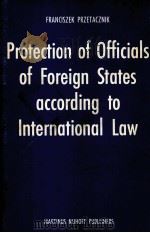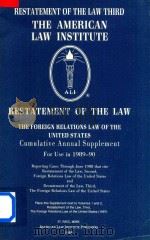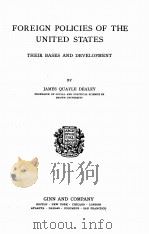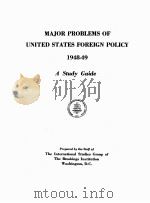《PROTECION OF OFFICIALS OF FOREIGN STATES ACCORDING TO INTENATIONAL LAW》
| 作者 | FRANCISZEK PRZETACZNIK 编者 |
|---|---|
| 出版 | MARTINUS NIJHOFF PUBLISHERS |
| 参考页数 | 390 |
| 出版时间 | 1983(求助前请核对) 目录预览 |
| ISBN号 | 9024727219 — 求助条款 |
| PDF编号 | 813695198(仅供预览,未存储实际文件) |
| 求助格式 | 扫描PDF(若分多册发行,每次仅能受理1册) |

Ⅰ.LEGAL BASIS OF THE PROTECTION OF OFFICIALS OF FOREIGN STATES AND ITS PERSONAL SCOPE1
1.Legal Basis for the Protection of Officials of Foreign States:Their Personal Inviolability3
The Definition of Personal Inviolability of Officials of Foreign States3
(a) Writers who speak of the personal inviolability of officials of foreign States but do not define it3
(b) Writers who define the personal inviolability of officials of foreign States4
(c) Writers who discuss the consequences arising from the personal inviolability of officials of foreign States6
(d) The Vienna Conventions and the Convention on Special Missions and the definition of personal inviolability of officials of foreign States8
(e) The personal inviolability of officials of foreign States - A privilege or an immunity10
2.The Personal Scope of the Special Protection of Officials of Foreign States14
Definition of Officials of Foreign States14
Ⅱ.THE DUTIES OF THE RECEIVING OR HOST STATE TOWARDS OFFICIALS OF FOREIGN STATES21
1.The Duty of Non-Commission by the Organs of the Receiving or Host State of Acts Infringing upon the Personal Inviolability of Officials of Foreign States23
Recognition of the duty of abstention24
The practice of States24
The duty of abstention in the context of the case of United States Diplomatic and Consular Staff in Tehran27
(ⅰ) Statements and declarations by Iranian officials27
(ⅱ) Statements and declarations by officials of other States28
The codification of diplomatic and consular law30
The doctrine of international law32
The essence of the duty of abstention32
2.The Duty of the Receiving or Host State of Preventing the Commission by Private Individuals of Acts Violating the Personal Inviolability of Officials of Foreign States39
Judicial decisions39
The practice of States40
The declarations recognizing special protection of officials of foreign States in connection with the violations of their personal inviolability41
The declarations recognizing special protection of officials of foreign States in connection with the codification of international law43
The codification of diplomatic and consular law44
(ⅰ) Unofficial codification44
(ⅱ) Official codification45
The doctrine of international law48
The definition of special protection49
The implementation of international conventions concerning the special protection of officials of foreign States50
The Vienna Conventions and the Convention on Special Missions50
The O.A.S.Convention and the U.N.Convention on Prevention and Punishment51
The aspects of special protection51
The real aspects of the special protection of officials of foreign States51
Preventive measures as a prerequisite to the real aspect of special protection52
The attitudes of the governments of the receiving States to the demands of kidnappers in return for safe release of their victims53
(1) Negotiations with kidnappers53
(2) Non-negotiation with kidnappers55
Reasons for which the governments of receiving States have refused to negotiate with the kidnappers55
Measures taken by the governments of the receiving States which refused to negotiate with the kidnappers56
3.The Duty of the Receiving or Host State to Punish the Perpetrators of Offenses Committed Against Officials of Foreign States65
The Juridical Aspect of the Special Protection of Officials of Foreign States65
The codification of international law65
The doctrine of international law66
The special protection of officials of foreign States in municipal legislation68
Sanctions for the violation of the personal inviolability of officials of foreign States69
Increased punishment69
Specified penalties70
The objective scope of punishable acts71
The extent of penalties72
Fulfillment of the duty of punishment73
The practice of States73
Punishment demanded by the sending States74
Punishment by the receiving States as fulfillment of their duty of punishment of persons guilty of violating the personal inviolability of officials of foreign States75
Capital punishment76
Life imprisonment77
Deprivation of liberty specified in time78
The Doctrine of International Law78
Implementation of the U.N.Convention on Prevention and Punishment80
4.The Duty of the Receiving or Host State to Cooperate with other States in Preventing the Commission of Offenses Against Officials of Foreign States and in Punishing the Perpetrators of Such Offenses87
The Recognition of the Duty of Cooperation87
Judicial decisions87
The practice of States88
The codification of international law91
The doctrine of international law93
The Duty of Cooperation in the U.N.Convention on Prevention and Punishment94
Ⅲ.THE CHARACTER OF CRIMES COMMITTED AGAINST OFFICIALS OF FOREIGN STATES101
1.Crimes Against Officials of Foreign States Are not Political Offenses103
The Definition of Political Offenses103
A confusion of terminology104
Judicial Decisions105
Bilateral treaties on extradition106
Multilateral treaties on extradition107
Extradition Statutes108
Constitutional provisions on extradition109
The Codification of Extradition Law110
The doctrine of criminal and international Law111
Kidnapping,Murder and Other Assaults Against the Life or Physical Integrity of Officials of Foreign States Are not Political Offenses114
The positions of States114
The preparatory documents of the U.N.Convention on Prevention and Punishment115
The codification of international law116
The U.N.Convention on Prevention and Punishment116
2.The Perpetrators of Crimes Against Officials of Foreign States Are Not Eligible for Asylum121
The Definition of Asylum121
The Right of Asylum122
The Basis for the Granting Asylum123
Persons eligible for asylum123
The decision of the International Court of Justice123
Multilateral treaties124
The codification of international law on asylum125
The Qualification of Grounds Justifying the Granting of Asylum Belongs to the State Granting It126
The decision of the International Court of Justice126
International treaties127
Multilateral treaties127
Bilateral treaties on extradition129
Codification of the law on asylum and extradition129
The Rule of the Qualification of Grounds Justifying the Granting of Asylum Does Not Apply to the Crimes Committed against Officials of Foreign States130
3.The Perpetrators of Crimes Against Officials of Foreign States are Extraditable135
A Definition of Extradition135
The Recognition of Extradition in International Law136
Extradition in the absence of a treaty136
Extradition treaties137
Extradition laws138
Extraditable crimes in extradition treaties and statutes139
Extraditable crimes in the codification of extradition law141
Extradition under the U.N.Convention on Prevention and Punishment142
Extradition of the Perpetrators of Crimes against Officials of Foreign States in the Practice of States144
Ⅳ.THE INTERNATIONAL RESPONSIBILITY OF TOE STATE FOR FAILURE TO FULFILL ITS DUTIES TOWARDS OFFICIALS OF FOREIGN STATES149
1.The Origin of the International Responsibility of States for Failure to Fulfill its Duties Towards Officials of Foreign States151
The Definition of the International Responsibility of the State151
The Internationally Wrongful Act of the State as a Source of its International Responsibility153
International tribunals153
The practice of States154
The codification of international law on State responsibility154
(ⅰ) Unofficial codification154
(ⅱ) Official codification155
The doctrine of international law155
Every State is responsible for its internationally wrongful act157
The notion of the internationally wrongful act157
Attribution as a substantial part of the subjective element158
The Violation of the Personal Inviolability of Officials of Foreign States Is a Breach of the International Obligations of the State Constituting an Objective Element of an Internationally Wrongful Act159
The existence of a breach of an international obligation159
Irrelevance of the origin of the breached international obligation160
International tribunals160
The practice of States160
The codification of international law on State responsibility161
(ⅰ) Unofficial codification161
(ⅱ) Official codification162
The doctrine of international law162
The International Obligation Must Be in Force to Be Breached163
The Kinds of Breaches of the International Obligations to Protect Specially Officials of Foreign States164
The Breach of International Obligations Requiring the Adoption of a Particular Course of Conduct164
The Breach of International Obligations Requiring the Achievement of a Specified Result166
2.The International Responsibility of the State for the Conduct of its Organs Violating the Personal Inviolability of Officials of Foreign States172
A.The Conduct of the State Organs as an Activity of the State172
The recognition of State responsibility for the conduct of its organs173
International judicial decisions173
The practice of States174
The codification of international law on State responsibility174
(ⅰ) Unofficial codification175
(ⅱ) Official codification175
The doctrine of international law176
Situations in which the conduct of State organs is attributed to it177
B.Unauthorized Acts of State Organs178
The non-responsibility of State for ultra vires acts178
The practice of States179
The codification of international law on State responsibility180
Arbitral decisions180
The responsibility of States for ultra vires acts181
The responsibility of States for acts committed within the apparent authority of their organs181
Arbitral decisions181
The practice of States182
The codification of international law on the responsibility of States183
(ⅰ) Unofficial codification183
(ⅱ) Official codification183
The responsibility of States for acts committed outside the apparent scope of authority of their organs184
Arbitral decisions184
The practice of States185
The codification of international law on the responsibility of States185
The doctrine of international law186
3.The International Responsibility of the State for the Conduct of Private Individuals193
International Arbitral Decisions193
The Practice of States194
The Codification of International Law on State Responsibility194
(ⅰ) Unofficial codification194
(ⅱ) Official codification194
The Doctrine of International Law195
The Theories of State Responsibility for the Conduct of Private Individuals196
1.The Theory of Culpa196
International tribunals197
The practice of States198
The codification of international law on State responsibility199
The doctrine of international law200
2.The Theory of Risk201
International tribunals201
The practice of States202
The codification of international law on State responsibility202
The doctrine of international law203
3.The Theory of Neglected Duties203
International tribunals204
The practice of States204
The codification of international law on State responsibility205
(ⅰ) Unofficial codification206
(ⅱ) Official codification206
The doctrine of international law207
4.The Duty to Make Reparation for an Internationally Wrongful Act Done to Other States in the Persons of Their Officials212
The Recognition of the Duty to Make Reparation212
International tribunals212
The practice of States213
The codification of international law on State responsibility214
(ⅰ) Unofficial codification214
(ⅱ) Official codification215
The doctrine of international law215
The features of reparation216
Types of reparation217
Essential Characteristics of Satisfaction219
Measures of satisfaction219
Apologies220
Expression of regret220
The manner of the presentation of regrets221
(ⅰ) Oral expression of regret221
(ⅱ) Written expression of regret222
Salute of the flag223
Disapproval224
The expiatory mission225
Official publication226
The punishment of guilty persons227
The violators of the personal inviolability of officials of foreign States are known227
(a) Satisfaction in the form of punishment of guilty persons given on the initiative of the responsible State itself227
(b) Satisfaction in the form of punishment of guilty persons demanded by the injured State228
Cases in which the violators of the personal inviolability of officials of foreign States are not known229
Demands of guarantees for the future230
Reparation stricto sensu231
The exhaustion of local remedies rule does not apply232
Reparation stricto sensu and pecuniary satisfaction in the practice of States233
Ⅴ.THE MEANS OF SETTLEMENT OF DISPUTES ARISING FROM THE FAILURE BY A STATE TO FULFILL ITS DUTIES TOWARDS THE OFFICIALS OF FOREIGN STATES241
1.The Prerequisites for the Pacific Settlement of Disputes243
The Definition of a Dispute244
The Ascertainment of a Dispute in the Borchgrave Case246
The Ascertainment of a Dispute in the Case of the United States Diplomatic and Consular Staff in Tehran247
2.The Means of Settlement of Disputes252
Negotiations252
The Practice of States255
The Case of U.S.Diplomatic and Consular Staff in Tehran255
Good Offices257
The Case of U.S.Diplomatic and Consular Staff in Tehran258
Mediation259
The Case of U.S.Diplomatic and Consular Staff in Tehran260
Commission of Inquiry261
The Case of U.S.Diplomatic and Consular Staff in Tehran261
Conciliation262
Conciliation in Conventions on the Protection of Foreign Officials263
Arbitration264
Arbitration in Conventions on the Protection of Foreign Officials265
The Practice of States266
3.The Judicial Settlement of Disputes by an International Tribunal271
The Jurisdiction of the International Court of Justice271
The Basis of the Court's Jurisdiction272
The Court's Jurisdiction under Special Agreement in the Borchgrave Case274
The Jurisdiction of the Court in the Case of U.S.Diplomatic and Consular Staff in Tehran276
The Judgment by Default279
Measures of Interim Protection281
Jurisdiction of the Court282
The nature of interim measures283
Requested measures284
The Claims of the United States286
The violation of the duty of abstention287
The violation of the duty of special protection288
The violation of the duty of punishment290
The violation of the duty of cooperation291
The Enforcement of the Judgments of the International Court of Justice293
Conclusions301
Bibliography313
Appendix345
Index of Authors351
Index of Cases357
Index of Subjects367
1983《PROTECION OF OFFICIALS OF FOREIGN STATES ACCORDING TO INTENATIONAL LAW》由于是年代较久的资料都绝版了,几乎不可能购买到实物。如果大家为了学习确实需要,可向博主求助其电子版PDF文件(由FRANCISZEK PRZETACZNIK 1983 MARTINUS NIJHOFF PUBLISHERS 出版的版本) 。对合法合规的求助,我会当即受理并将下载地址发送给你。
高度相关资料
-

- THE FOREIGN SERVICE OF THE UNITED STATES
- 1985 WESTVIEW PRESS
-

- THE LAW OF THE SEA:ARCHIPELAGIC STATES
- 1990 UNITED NATIONS
-

- THE LAW OF THE SEA:PRACTICE OF ARCHIPELAGIC STATES
- 1992 UNITED NATIONS
-

- Restatement of the Law the Foreign Relations Law of the United States
- 1989 American Law Institute Publishers
-

- INDIAN PRIVATE INTENATIONAL LAW
- 1982 STERLING PUBLISGERS PRIVATE LIMITED
-

- ACCORDING TO HOYLE
- 1981 FAWCETT CREST
-

- The Politics of United States foreign policy
- 1993 HARCOURT BRACE JOVANOVICH COLLEGE PUBLISHERS
-

- THE FOREIGN TRADE OF THE UNITED STATES
- 1922 CHARLES SCRIBNER’S SONS
-

- FOREIGN POLICIES OF THE UNITED STATES
- 1926 GINN AND COMPANY
-

- HISTORY OF THE FOREIGN POLICY OF THE UNITED STATES
- 1933 G.P. PUTNAM’S SONS
-

- MAJOR PROBLEMS OF UNITED STATES FOREIGN POLICY 1948-1949
- 1948 THE BROOKINGS INSTITUTION WASHINGTON
-

- FOREIGN RELATIONS OF THE UNITED STATES 1901
- 1941 REPRINTED IN CHINA
-

- THE RECENT FOREIGN POLICY OF THE UNITED STATES
- 1925 THE ABINGDON PRESS
提示:百度云已更名为百度网盘(百度盘),天翼云盘、微盘下载地址……暂未提供。➥ PDF文字可复制化或转WORD

